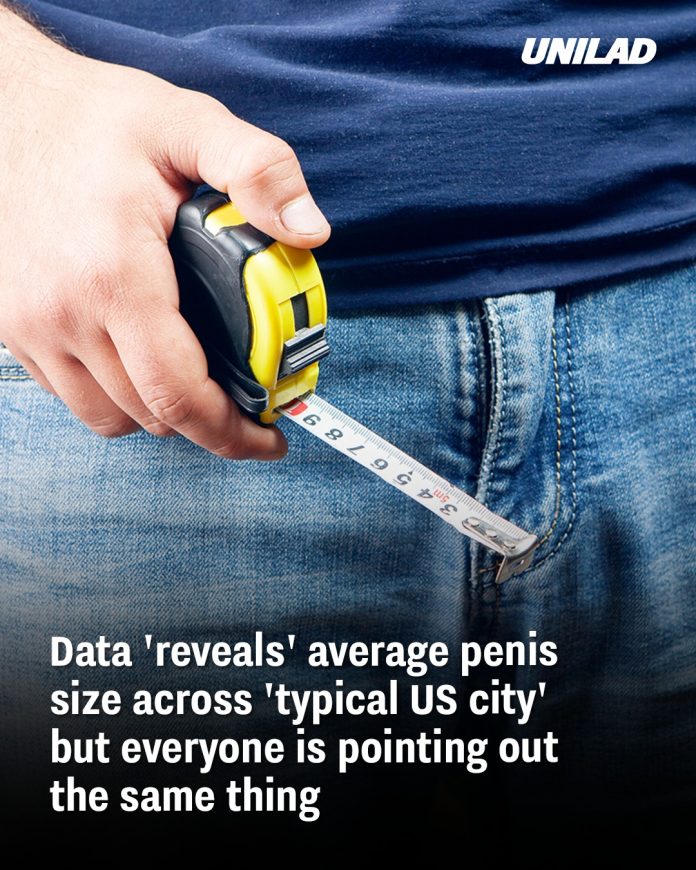A recent analysis has sparked widespread discussion by attempting to reveal the average penis size across a typical U.S. city. The data, which emerged from a Reddit post, claims to represent the distribution of erect penis lengths among 200,000 men. However, the lack of transparency regarding the study’s methodology and the absence of identifiable sources have led to skepticism about its validity.
The Data and Its Reception
The Reddit post presented a graph illustrating the estimated distribution of erect penis lengths in a mid-sized U.S. city. The graph’s Y-axis indicated the number of men, while the X-axis displayed various penis length categories. According to the post, the data was collected from 200,000 men, but no information was provided about who conducted the research, when it was done, or the methods used for data collection.

Social media users quickly pointed out several issues with the data. Many questioned the authenticity of the study, noting the absence of a credible source and the potential for self-reporting bias. Some users humorously referred to the statistics as “statisdicks,” highlighting the dubious nature of the information. Others expressed concern that the data could perpetuate unrealistic standards and contribute to body image issues among men.
Understanding Average Penis Size
Scientific studies have attempted to determine the average penis size, though results can vary based on measurement methods and sample populations. A comprehensive review published in the British Journal of Urology International analyzed data from over 15,000 men and found the average erect penis length to be approximately 13.12 cm (5.16 inches). The study emphasized that penis size varies widely and that most men’s sizes fall within a normal range.
It’s important to note that self-reported measurements often tend to be larger than those obtained through clinical assessments. This discrepancy can be attributed to factors such as measurement errors, social desirability bias, and the tendency for individuals to overestimate their own attributes.
The Impact of Misinformation
The dissemination of unverified data on sensitive topics like penis size can have significant psychological effects. Men may experience anxiety, low self-esteem, or body dysmorphic disorder (BDD) when comparing themselves to purported averages that may not be accurate. BDD is a mental health condition characterized by obsessive focus on perceived flaws in appearance, which can lead to distress and impair daily functioning.
Healthcare professionals caution against placing undue emphasis on penis size, as it does not correlate with sexual satisfaction or performance. Instead, factors such as communication, emotional connection, and mutual understanding play more substantial roles in sexual relationships.
Cultural and Regional Variations
Studies have explored variations in average penis size across different countries and regions. For instance, research indicates that the average erect penis length in Ecuador is approximately 17.61 cm (6.93 inches), while in countries like Cambodia, the average is around 10.04 cm (3.95 inches). These differences highlight the diversity of human anatomy and underscore the importance of considering cultural and genetic factors when discussing such topics.
However, experts warn against using these statistics to make comparisons or judgments, as individual variation is considerable, and the data may not account for methodological inconsistencies or reporting biases.
The Role of Media and Social Platforms
The viral nature of the Reddit post and its subsequent coverage by media outlets like UNILAD demonstrate how quickly misinformation can spread online. Social media platforms often amplify sensational content, which can lead to the widespread acceptance of dubious information. This phenomenon underscores the need for critical thinking and media literacy among consumers.
Journalists and content creators have a responsibility to verify the accuracy of the information they share, especially on topics that can influence public perception and individual well-being. Providing context, citing credible sources, and acknowledging uncertainties are essential practices in responsible reporting.

Promoting Healthy Perspectives
To foster a more realistic and healthy understanding of body image, experts recommend focusing on overall well-being rather than specific physical attributes. Engaging in open conversations about body diversity, challenging societal norms, and promoting self-acceptance can help mitigate the negative effects of misleading information.
Educational initiatives that provide accurate information about human anatomy and sexual health can empower individuals to make informed decisions and develop positive self-perceptions. By emphasizing the value of personal qualities and interpersonal connections, society can move toward a more inclusive and supportive environment.
The controversy surrounding the Reddit post on average penis size in a typical U.S. city highlights the challenges of interpreting and disseminating sensitive information. Without transparent methodology and credible sources, such data should be approached with skepticism. Ultimately, promoting accurate information, fostering open dialogue, and encouraging self-acceptance are key to addressing the complex issues related to body image and self-esteem.

















